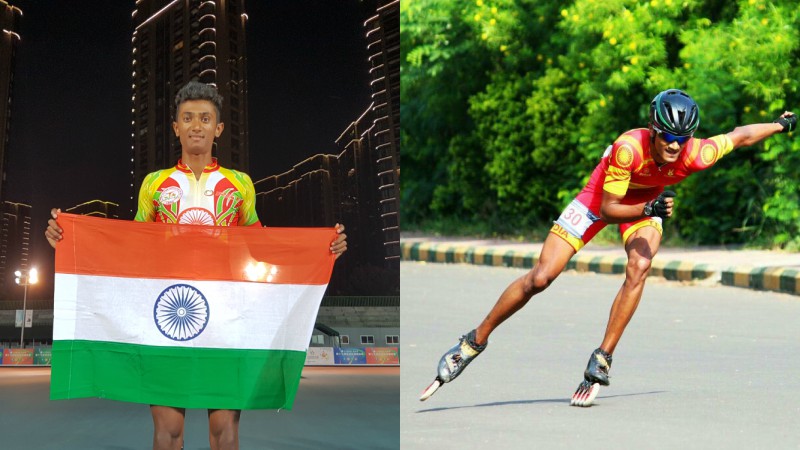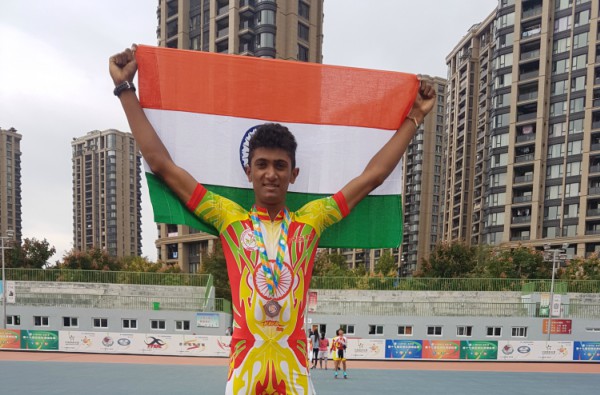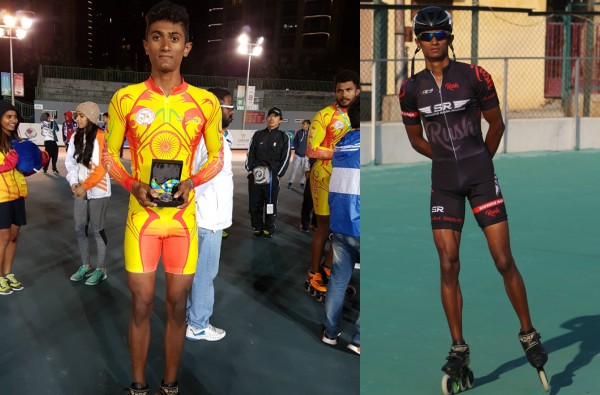
“It was quite difficult when I started off, right from finding a good coach to tiring sessions and balancing studies but, after I won my first medal, there was no looking back,” says elite skater, Dhanush Babu as he recounts his journey to the two Asian Bronze medals in October this year.
For this 22-year old skater, coach and freelance ethical hacker from Bangalore, the journey to the Asians and the medals in October were nothing that he could skate by, and every step through the 18 years was a struggle right from when he began skating in 1999.
But that is just not it, being the world’s 13th fastest skater and the Asian medals in Rink and Road Relay is not something that satisfies him, “Skating is my passion and I will continue to aim higher than my present position” he says as he views this as a milestone in his skating career and aims to be the best in the world one day.
SRUTHI BHAT (SB): What was your primary challenge when you began skating?
DHANUSH BABU (DB): The first problem that I faced was finding proper coaches. I am a leftie and turning on the track was always a problem. It was tough to find a coach to suit this major difference I had. So then, my dad trained to be a coach and since then he has been coaching me.
You won your first national medal in 2001 when you were six, and there has been no looking back since. How easy was it for you to manage both skating and academics?
To be honest, both my school and junior college did not support my skating but then skating as my passion, and I decided to keep education aside and go ahead with it.

What was an infrastructural drawback that you faced as a skater?
The track that I had access to was a very small one and was not of the prescribed international standard. The very first international skating track in Bangalore came up in 2007 and until then I had to travel to different places like Mysore, Chennai, Delhi and Mumbai to get access to tracks that meet the international requirements.
Do you think the above-stated problems are now solved?
There are many skaters who are still waiting for proper tracks to skate on. If they have a better place to train, their performance will definitely improve. A 130m synthetic track which is considered apt for training is very costly and there are no sufficient funds available for its construction from the federation’s budget or from the Government.
What Government support do you receive as skaters? Is the support sufficient?
The government awards both national and international medalists with a cash award but, the prize money hardly suffices for the costs incurred to participate and win that medal. Also, scholarships by the government are usually given in the form of reimbursement of expenses with a ceiling, but, skating being a very expensive sport, many are unable to meet the expenses and wait for reimbursement. This discourages many talented skaters from participating in international events.
What is the role played by the Skating Federation to support elite skaters like you?
The federation morally supports the skaters and encourages us to participate in national and international events but, there is not much motivation from them in- terms of winning the events participated in. Their main focus is on sending skaters to the events and bringing them back irrespective of the results of the tournament. They conduct district, state and national level competitions periodically. But apart from that, there isn’t much financial support from the federation.
What are your views on the coaching program available for coaches in India?
There is no exclusive coaching program available to train skating coaches in India. But, if a coach is dedicated, the quality of the training is high regardless of their qualification. The coach needs to be talented and dedicated even if he isn’t qualified because a dedicated coach always sees room for improvement which can be sought out by a trial and error method based on mutual trust between the coach and the skater.

How did you begin coaching? Did you undergo any special training before you began coaching?
I went to Italy in 2012 and I happened to meet a few coaches there. After speaking to them I attended a coaching program. Since then, I tried various techniques on myself based on trial and error which helped in forming generalised training techniques which I apply when I train my students.
A little more on you academy and your life as a coach there?
I and a few other skaters have a skating club called ‘City Skaters’ where we train about 150-250 students out of which 3-4 are international level skaters and about 150 national skaters and 100 district level skaters.
What does your club do to battle the infrastructural drawbacks that prevail in skating?
We train students from Government schools, Colleges and Government Aided schools and colleges free of cost. This does not affect us in any way as we can afford to train these kids for free from the fees received from the training of other students. At the end of the day, we do not want to stop good talent from going waste.
If there was one thing you could do to enhance training given to your students, what would it be?
I would arrange to get in international coaches from abroad at least thrice a year for all the skaters. Usually, foreign coaches come to India upon request by individual skaters who can afford to pay such large amounts for the special training. I want to make such training of international standards accessible to all skaters in the country.
What challenges do you face as a coach?
It is difficult to train the kids these days as they aren’t willing to put in a lot of effort. They get everything that they want easily and they apply the same logic to skating. Also, the parents do not like exerting their kids a lot. They do not understand that the lesser effort and training invested will result in reduced performance and results.
As a club, what challenges do you face?
We are a bunch of youngsters who do not depend only on the skating coaching for our source of income, thereby; we charge minimal fees from our students which is about 250 rupees a month per child. The public generally associates skating to a very expensive sport and assume that due to the minimal fees, the quality of the training will be compromised. As a result, attracting talented skaters becomes a huge challenge for us.
How is the medical infrastructure in the country for treating injuries occurred during skating?
(laughs) We are immune to falling. There are a lot of injuries on and off the track during and off competitions but usually, they aren’t very serious ones that would need special care. Regular exercise helps in keeping injuries at bay and also helps in reducing damage during an injury. This exercising both as a preventive measure and cure to injuries is usually in the form of workout and physiotherapy which is easily accessible by all athletes.
Does an injury affect your participation and performance in any way?
No, Not really. In a case of serious damage we are advised to not skate until recovery but, post recovery an injury doesn’t really affect our performance. There are very few cases of people quitting the sport because of an injury. Once a skater is ensured that due care and medical attention is been given to the injury and they have healed, they start skating again. It takes a few days to get back in form, but that doesn’t lead to a person quitting it. The injury is never a demotivation to us.
So of all the challenges you mentioned before, what according to you will help to change the picture of skating in India and ensure that there are more of the likes of you in the future?
Firstly, People need to start taking skating seriously as a sport and for that to happen we need proper coverage from the media. The general public needs to be made aware of the sport and the seriousness of it. Once that is done, it would then become easier to approach sponsors making the sport affordable and result in identifying, moulding and retaining talented skaters across the country.





